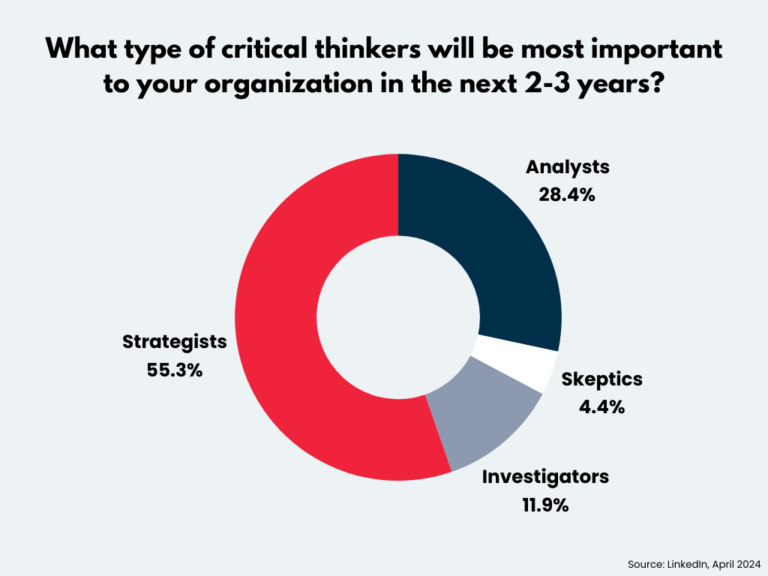Critical Thinkers: Poll Results Reveal Troubling Gaps in Leadership Priorities
In today’s fast-paced, technology-driven world, businesses face an ever-evolving landscape filled with both unprecedented opportunities and complex challenges. Navigating this dynamic environment requires not just a singular approach but a blend of diverse perspectives and skills. To gain insight into what critical thinking skills are deemed most vital for the near future, I conducted a simple poll among business leaders on LinkedIn.
The results were shocking.
This article delves into the poll’s findings, explores the crucial skills each type of thinker brings, and shares solid approaches to combat gaps in leadership beliefs at a time when foresight is paramount.
Poll: The Most Vital Critical Thinkers for the Near Future
Recently, I conducted a LinkedIn multiple choice poll among business leaders to determine which type of critical thinker they considered most crucial for the next 2-3 years, given the rapidly evolving technological landscape. The options were:
- Analyst
- Skeptic
- Investigator
- Strategist
Deep Dive into Roles
Analysts
Methodical and precise, Analysts employ a systematic approach to unravel complex issues. With an unwavering focus on details and data, they excel at drawing logical conclusions grounded in evidence. Their ability to evaluate performance metrics and contribute to resource optimization aids strategic decision-making, ensuring that decisions are based on solid data and supported by necessary evidence.
Skeptics
Ever-questioning, Skeptics challenge the status quo with a relentless pursuit of truth. Through rigorous inquiry and a discerning eye for biases and fallacies, they navigate through information, fostering a deeper understanding by dismantling flawed arguments. By questioning assumptions and considering potential downsides, Skeptics offer dissenting perspectives crucial for identifying risks and ensuring that strategic plans are robust and comprehensive.
Investigators
Driven by curiosity and armed with a thirst for knowledge, Investigators dive into the depths of research. Skillfully gathering data from diverse sources and synthesizing findings, they weave together insights to uncover hidden truths and unravel complexities. Their work ensures that the organization remains aware of emerging trends and potential disruptions, providing the foundational data that Strategists and Analysts need to make informed decisions.
Strategists
With a panoramic view of the landscape, Strategists master the art of strategic thinking. They evaluate multiple perspectives, anticipate consequences, and craft meticulously thought-out action plans. Armed with clarity and foresight, they navigate through intricate systems with precision. Strategists are adept at setting long-term goals and identifying the pathways to achieve them, making their role crucial for navigating change and uncertainty, particularly in technology-driven environments.
Results: Leadership Undervaluation of Key Roles
The poll results from 67 different leaders highlight a critical issue: the alarming undervaluation of individuals who possess key skills essential for positive organizational transformation.

The poll results show that 28% of respondents consider Analysts crucial, 4% prioritize Skeptics, 12% value Investigators, and a significant 55% believe Strategists are the most critical for the next 2-3 years.
While the importance of Strategists and Analysts is not surprising, the significantly lower ranking of Investigators and Skeptics raises serious concerns. This disparity suggests a potential oversight in appreciating the full spectrum of critical thinking roles.
- Investigators are essential for monitoring and interpreting trends. They provide foundational data for Strategists and Analysts to make informed decisions. Without Investigators, organizations may lack the insights they need to foresee and react to changes. These people seek the right information and approaches to benefit all.
- Skeptics play a critical role by challenging assumptions and highlighting potential risks. Their presence fosters constructive criticism and helps prevent groupthink. Overlooking Skeptics can lead to a culture where critical evaluation is undervalued, increasing the risk of strategic missteps.
Solution: Create Balance
To build a resilient and adaptable organization, it is essential to foster approaches that value the contributions of all critical thinking roles—Strategists, Analysts, Investigators, and Skeptics. This ensures comprehensive, informed, and resilient decision-making.
- Adopt a Holistic Approach: Value the contributions of all critical thinking roles—Strategists, Analysts, Investigators, and Skeptics. This ensures comprehensive, informed, and resilient decision-making. Each role brings a unique perspective and set of skills that, when integrated, create a more robust and adaptable strategy.
- Foster Collaboration: Ensure that leaders, such as Chief Strategists, genuinely consider the input of Analysts, Investigators, and Skeptics. Ignoring these perspectives can lead to suboptimal outcomes and missed opportunities. Effective collaboration across these roles can uncover hidden insights and create innovative solutions.
- Value Dissenting Views: Encourage a culture that welcomes opposing views and constructive feedback. Reliable and focused input, even if contradictory, highlights potential blind spots and enhances decision-making. By embracing dissenting opinions, organizations can avoid the pitfalls of groupthink and make more balanced and well-considered decisions.
- Promote Skill Diversity: Acknowledge that individuals often possess multiple skills to varying degrees. Strive for a diversity of skills within the organization, understanding that some will be more developed than others. Ensure that all voices and skills are represented and leveraged collaboratively for the organization’s success. A diverse skill set within a team can lead to more innovative and resilient strategies.
Navigating the Technological Landscape
In an era where decisions must be made swiftly due to rapid technological advancements, the importance of diverse critical thinking skills cannot be overstated. Organizations can navigate challenges more effectively and capitalize on emerging opportunities by valuing and integrating the roles of Strategists, Analysts, Investigators, and Skeptics. Ensure these skills and perspectives are recognized and actively sought out and utilized to drive innovation and stability.
Conclusion
In summary, while Strategists and Analysts are undeniably important, the contributions of Investigators and Skeptics are equally vital for holistic and effective strategic planning. Balancing these roles will enable organizations to thrive in a fast-paced, technology-driven future.

